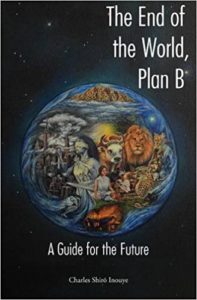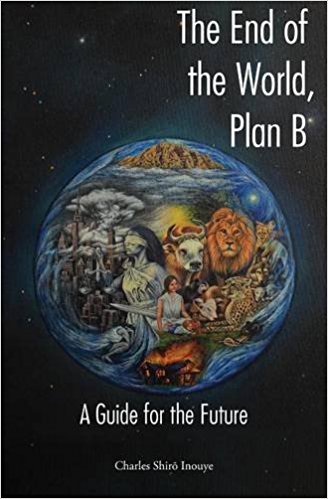 Charles Shiro Inouye has just written a fantastic book, The End of the World, Plan B: A Guide for the Future (Greg Kofford Books, 2016). In it, he demonstrates how the most popular ways of framing Apocalyptic narratives—as a violent and cataclysmic event that makes clear the triumph of justice in which the wicked are punished and the righteous rewarded—does not actually match the fullest view on this subject as taught by the great world religions. Justice as the supreme virtue reigning over the end of all things has never been the main point, nor is it the best understanding of that virtue. Certainly it is important, but justice is intended to ultimately lead us toward compassion and a viewing of the world and its inhabitants, human as well as other forms of life, as God does, or as Dharma or the Tao attempt to call us toward. Apocalyptic teachings—with the word “apocalypse” referring to the great “revelation”—whether applied to the final end of the world and human inhabitants, or to our own end of the world that comes with our death, are instead designed to lead us into self-examinations of the world’s conditions, what justice would demand, including its implications for our lives, our own complicity in suffering or unfairness that comes from our communal lives, as well as the sobering realizations that agency will always make it impossible for us to ensure that our children will choose our same values as theirs. The teachings are not to make us feel smug that we’ll the “saved” remnant when the final bell might toll for the earth. Instead, what justice is designed to do, ultimately, is to lead us through sorrow to a state of coming to recognize as our own state of being what it is that God sees, and to then turn in compassion toward those not yet understanding the true nature of reality and the highest forms of fulfillment. It is to call us to be “saviors on Mount Zion,” to the path of the Bodhisattva who postpones her or his own entrance into Nirvana in order to be with and teach and model compassion to all forms of life, to the “hero’s journey” described by Joseph Campbell and others that is and embodied in so many stories the world over and in every generation of the one who passes through trials and sorrows, learning from each challenge how she or he has falsely identified with various aspects of life that have prevented their true nature from fully shining forth, only to then come to grasp the life of the Gods and then return to her or his community as a teacher/savior. “Plan B” encompasses learning and turning of these sorts. It is a powerful way of understanding so much that is compelling at the heart of the great world religions, so much that is on the path of a genuine spiritual adventurer.
Charles Shiro Inouye has just written a fantastic book, The End of the World, Plan B: A Guide for the Future (Greg Kofford Books, 2016). In it, he demonstrates how the most popular ways of framing Apocalyptic narratives—as a violent and cataclysmic event that makes clear the triumph of justice in which the wicked are punished and the righteous rewarded—does not actually match the fullest view on this subject as taught by the great world religions. Justice as the supreme virtue reigning over the end of all things has never been the main point, nor is it the best understanding of that virtue. Certainly it is important, but justice is intended to ultimately lead us toward compassion and a viewing of the world and its inhabitants, human as well as other forms of life, as God does, or as Dharma or the Tao attempt to call us toward. Apocalyptic teachings—with the word “apocalypse” referring to the great “revelation”—whether applied to the final end of the world and human inhabitants, or to our own end of the world that comes with our death, are instead designed to lead us into self-examinations of the world’s conditions, what justice would demand, including its implications for our lives, our own complicity in suffering or unfairness that comes from our communal lives, as well as the sobering realizations that agency will always make it impossible for us to ensure that our children will choose our same values as theirs. The teachings are not to make us feel smug that we’ll the “saved” remnant when the final bell might toll for the earth. Instead, what justice is designed to do, ultimately, is to lead us through sorrow to a state of coming to recognize as our own state of being what it is that God sees, and to then turn in compassion toward those not yet understanding the true nature of reality and the highest forms of fulfillment. It is to call us to be “saviors on Mount Zion,” to the path of the Bodhisattva who postpones her or his own entrance into Nirvana in order to be with and teach and model compassion to all forms of life, to the “hero’s journey” described by Joseph Campbell and others that is and embodied in so many stories the world over and in every generation of the one who passes through trials and sorrows, learning from each challenge how she or he has falsely identified with various aspects of life that have prevented their true nature from fully shining forth, only to then come to grasp the life of the Gods and then return to her or his community as a teacher/savior. “Plan B” encompasses learning and turning of these sorts. It is a powerful way of understanding so much that is compelling at the heart of the great world religions, so much that is on the path of a genuine spiritual adventurer.
In this two-part episode, author Charles Shiro Inouye joins Charles Randall Paul, James McLachlan, and Mormon Matters host Dan Wotherspoon for a discussion of these elements present in the great traditions, and which serve–whether distant or immediate–as a call to us all, as something we recognize in our deepest core as the common denominator of our spiritual heroes. Toward the end, the panelists also speak of connections and differences between eastern ideas about “non-attachment” and “nothingness” and LDS (and other western) notions of “eternal” families/relationships. Are there also connections between these concepts and the call of Zion for its members to be of “one heart and mind”?
We hope you will listen to this episode and then share your ideas and questions in the comments section below. We encourage you to use the World Table comment system as Mormon Matters will soon be switching to it exclusively.
To learn more about the World Table system and its purposes, please view this short video.
___________
Links:
Charles Shiro Inouye: The End of the World, Plan B: A Guide to the Future (Greg Kofford Books, 2016)
If you purchase this book via the link above, a small portion of the purchase price will go to support Mormon Matters. Please shop away, and while there on Amazon via this portal, purchase more things (your shopping for other things will also aid the podcast). Thank you, so much!


Comments 4
I’m only 1/3 through part one. However, the concept of justice leading to sorrow got me thinking. I haven’t fully endorsed the concept, yet, I find it persuasive. What’s clear to me is justice is an inferior path when compared to compassion.
The pursuit of justice is the path of conditional forgiveness. It never leaves you truly satisfied once it has been served. It’s delayed gratification that doesn’t pay its full dividend.
Sure it offers you something, but in likening it to the time value of money, forgiveness today is better than forgiveness tomorrow.
Christ’s forgiveness is theoretical unconditional, yet the Mormon tradition we tie too many conditional strings to it.
It’s these unnecessary strings that beg us to request justice for others actions when justice is not ours to serve.
Justice has taught me great lessons, yet compassion is what tends to alter my behaviors.
So the questions arises whether justice leads to sorrow? I’m not sure. However, I can say, justice leads to delayed peace. Why delay peace when you can have it today?
In suppose delaying peace perpetuates the world’s sorrow. As such, justice leads to sorrow.
I’ll keep listening.
I am only partially into Part 1 as well, but wanted to back up a bit and say something about God weeping. I think the term ‘sorrow’ needs a more detailed definition. The kind of sorrow that brings me to tears because of another’s suffering is not anything at all like the sadness/sorrow I feel when I am in self-pity, anger, indignation, etc. It’s as if those two expressions (weeping for others/weeping for ourselves) are worlds apart, not even from the same source, perhaps.
When I have wept out of compassion for others, I don’t feel smaller, emptier, darker – it’s the opposite of that — it’s an enlarging and enlightening, a beautiful feeling, in a way that we don’t really have adequate language to capture. I don’t think we will necessarily suffer if our capacity to weep continues into immortality. It’s not a draining or soul-sucking kind of weeping, but the exact opposite, and is rooted in love. I believe God weeps because he loves.
(The closest literature that describes what I’m trying to say is from Rudyard Kipling. “Holden went to his bungalow and began to understand that he was not alone in the world, and also that he was afraid for the sake of another, — which is the most soul-satisfying fear known to man.”)
The first part deeply touched my heart and fulfilled an earnest desire to hear thoughts such as these, to have my own experience with gnosis validated, and expansive theology discussed in a way that calls each of us to do better and be better because that is what our divine natures call us to be after a certain point of spiritual maturation. Turning back toward the burning house is an apt parallel where I sense myself to be, and it’s s lonely place. I was so touched to find a forum discussing this process as well as others who have experienced similar things. I can’t wait to listen to Part 2 and 3. I will likely return to Part 1 again and again, which meanders already on my short list of my favorite podcast episodes of all time.
Absolutely loved this Dan. I had already heard Charles on A Thoughtful Faith but found this fresh with additional insights. Charles has written a book for the ages. A book with ideas and “doctrine” that we would truly benefit from following. I hear echoes of these themes in Pope Francis and the Dalai Lama. Keep up the good work.